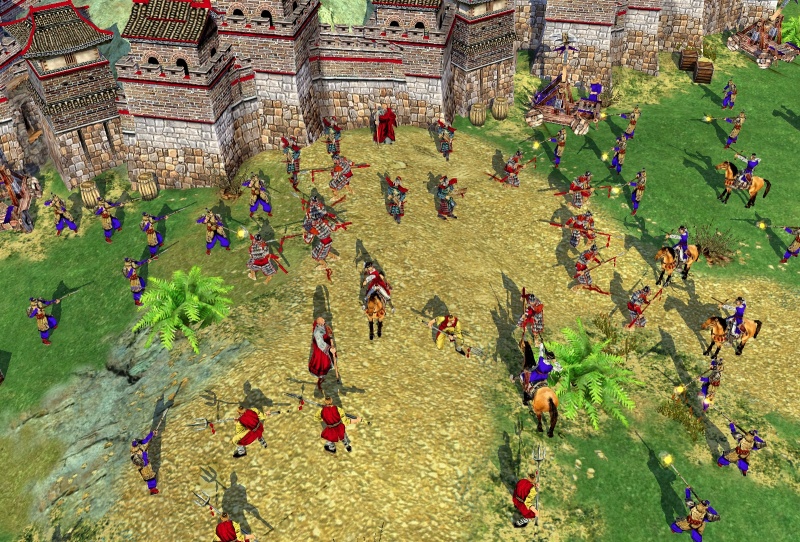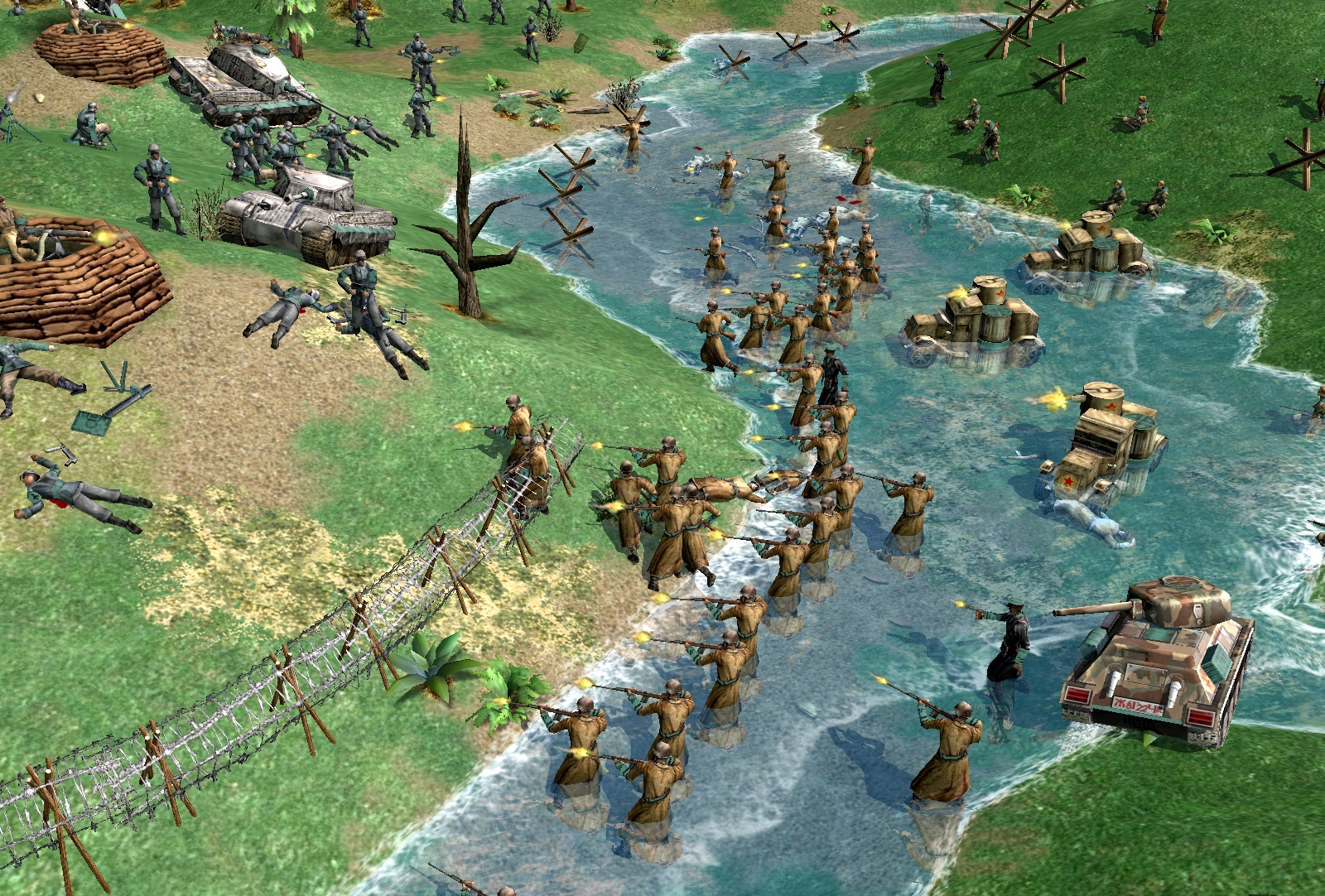Empires Dawn Of The Modern World Downloads
Much like Stainless Steel Studios' first game, Empire Earth, Empires: Dawn of the Modern World is a 3D strategy title in which players must lead a civilization to global domination. The game takes place from 950 AD to 1950 AD, which includes the Middle Ages, Gunpowder Age, Imperial Age, World War I, and World War II.
Nations available for play include the French, Germans, United States, Koreans, Chinese, British, and Russians. Each nation has its own strengths and weaknesses; the Germans have significant air power while the Chinese make excellent use of gunpowder. Historically accurate units are available in each age, from plague-carrying cow carcasses thrown by catapult to the German V2 rocket.
Empires: Dawn of The Modern World is a real-time strategy game in which you take control of one of nine different civilisations and lead it to victory over your rivals by collecting resources and capturing your enemies'.
The number and variety of units increases as each game progresses, allowing nations to do battle on land, at sea, and in the air. Single-player games offer random maps against up to seven computer opponents and a campaign mode. There are three campaigns, each featuring one of the greatest military leaders in history: General Patton, Richard the Lionheart, and Admiral Yi. Empires' multiplayer component allows for up to eight players to fight together or against one another online. Rick Goodman is a guy who knows his real-time strategy games. As the lead designer for Age of Empires, he dramatically improved the basic gameplay mechanics in the post-Starcraft era by deepening the gameplay, providing more control, more units, and a more complicated combat model.

He continued this trend in his next game, Empire Earth - a great title that some felt suffered a bit from being too broad (players could take 21 civilizations across dozens of time periods from cavemen to spacemen) and by being somewhat unfriendly to RTS newbies. His latest title, Empires: Dawn of the Modern World, might as well have been titled Empire Earth II because you get the same basic gameplay. The biggest difference is that the game's focus has tightened (there are only four time periods and nine civilizations), and the civilizations are more distinct and detailed.
Fortunately for Empire Earth veterans and RTS fans, the changes work, making Empires: DotMW a must-have for serious strategy gamers. The game's still unfriendly to newbies, though. As is my usual pattern with RTS games, I started playing Empires in single-player mode. The single-player game consists of three different campaigns detailing the military careers of three military geniuses.
The first is based on Admiral Yi's defense of Korea from a Japanese invasion. The second is about King Richard's defense of the British crown, and the last follows George Patton's march through North Africa and France. The single-player missions in the campaign are heavily scripted, and rely on placing the player in unusual situations with limited resources or units. One mission in the Korea campaign, for example, has the player running last-ditch defenses of three castles in which the player attains victory by killing a certain number of enemies before being overrun. The player then has to sneak around the map and solve what is essentially a puzzle to take the castles back. Taken by themselves, the Empires campaign missions are a lot of fun. True, the script isn't very well written (and is overly expository), and isn't helped by mediocre voice acting that plays over the cutscenes.
But assuming a player enjoys all kinds of unusual strategic situations with limited resources and units and solving strategic puzzles, the Empires campaigns are well worth the investment of time. On the other hand, once players start playing multiplayer, that's where Empires truly shines.
The game offers two distinctive types of multiplayer games - 'Action' and 'Empire Builder.' An 'Action' game reduces the amount of resources on the map, shrinks the map size, and weakens defensive options to make the game one of quick buildups and a lot of action, combat, and rushing.
'Empire Builder' is just the opposite, with huge maps, lots of resources, and plenty of encouragement to turtlers who like to build big armies. Both variants are a lot of fun, though they will obviously appeal to different types of gamers. Both also seem to be well-balanced, a pretty amazing achievement when you consider the radically different requirements for each playstyle. Empires sports nine civilizations the player can choose from, and unlike many RTS games where the distinction between sides is no more than skin-deep, each Empires civ offers players a completely different experience. The civs share no art assets and no units in common.
Even the way they gather resources is different. Asus eee pc 701 4g drivers windows 7. The English, for example, have 'Labor Unions' that automatically build any structure that a citizen starts, and they have food warehouses and Welsh mining colonies that automatically generate food and gold. These cultural differences extend to military powers as well.

The English and the French, for example, are the strongest defensive powers in the game, while the Germans, with their awesome Tiger Tanks are nearly unstoppable on land. Functionally, that means that players will have to master different strategies and playstyles for every civilization in the game. Even better, those strategies need to shift based on the civilizations they're at war with. Victory as the British in a World War II era game against the Germans will require very different tactics than playing as the British against the Russians.
It's this sheer strategic depth that makes Empires such a joy to play. A player will need to be able to adjust their playstyle on the fly based on who they're up against, and who their allies are. That makes using the game's built-in auto-matching especially exciting when setting the options to give all players a random civilization. Some of the most fun I had during my online games came from setting up a particular defensive strategy that worked well for my civilization only to find that my opponent is playing the one civilization that that strategy is almost useless against. The game's camera options are rather interesting. The camera can zoom from directly overhead to a perfectly serviceable isometric viewpoint to a first-person position directly on the battlefield. The camera can also rotate the playfield in any direction desired.
While I appreciate the ability to fine tune my view to a perspective to one that works well for me, the inclusion of the on-field perspective is puzzling. It looks cool (and makes for some awesome screenshots), but it's also completely useless for playing the game. This isn't really a criticism, though. 95% of the time I found a comfortable view and stuck with it, and if I ever used the rotation feature, I can't remember it. It's just odd that Stainless Steel Studios would include a feature that really doesn't do anything.
Movement and combat AI is excellent - especially the algorithms that control citizens. The annoying necessity of micromanaging resource collectors is one that's plagued this genre since the Command & Conquer days. Empires: DotMW citizens, while certainly not perfect, seem quite capable of working without supervision and even manage to sensibly select jobs for themselves based on their proximity to resources. This 'common sense' AI is also found in military units who have a nice knack for focusing their firepower on enemy units where it'll be most effective. I would have loved to see a player controllable option that would allow units to occasionally use their special abilities without player input, though. As it stands now, special powers must be activated by the player.
Empires Dawn Of The Modern World
In 'Action' style games where armies tend to be smaller, and precise unit control is easier, this isn't an issue. 'Empire Builder' games, on the other hand, tend to have clashes between enormous armies, making the correct use of special powers tough, even using hot keys. Pathfinding for both civilian and military units is good. It's nice to see groups of combined arms who can arrange themselves somewhat sensibly while walking together. It's not perfect, however. It's not uncommon for infantry and wheeled (and mechanized) units marching together to trip each other up in tight spaces. This became a particular problem for me while trying to set up Korean Arrow Carts in small areas on high hills.
The Arrow Carts would jockey around each other and occasionally leave the hill altogether as the pathfinding AI decided to try an alternate route. Graphically the game is good, though not awesome. There are some very nice graphic effects, particularly the waves and unit reflections in water. Some of the unit animations are a bit stiff, though, and explosion graphics run the gamut from silly little pops to huge booms that are kind of annoying. The game's sound is pretty poor, too. The music is so bland it's practically nonexistent and an interesting use of sound effects to let a player know when unit production is complete doesn't quite work as intended.
Distinguishing the 'unit's done' effect from other sounds in the game can be incredibly difficult - the game really needs a bog-standard RTS-style voice-over to let you know when units are ready. All of those things, however, should be taken in the spirit of constructive criticism.

While the game's complexity and strategic depth make it a somewhat high-end game designed for RTS veterans, a better single player campaign or even a decent tutorial might have opened the game up to a new audience. Anyone willing to put in the time and effort, though, will find Empires: Dawn of the Modern World has it where it counts. The basic gameplay is rock-solid, and fans of multiplayer RTS games will get far more than their money's worth out of it. People who downloaded Empires: Dawn of the Modern World have also downloaded:, ©2017 San Pedro Software Inc. Contact:, done in 0.002 seconds.
Empires: Dawn of the Modern World is a real-time strategy developed by Stainless Steel Studios, which he became famous in the world with the game called Empire Earth. The creator looked at in great detail the tastes of the players on your favorite historical periods and in contrast to Empire Earth, where the theme was the development of mankind from the beginning until the distant future, here the focus was on 1000 years of history of civilization spanning the period from the middle ages to World War II.
The same applies To the size of the maps, which applies to the action – players recognized that Empire Earth the most liked them those huge (like 'gigantic' or 'large islands'), therefore, Empires: Dawn of the Modern World, the focus was on areas with these sizes. Note: The Demo allows you to play single and multiplayer.
Action demo was located during World War II, and it contains one dedicated scenario game in single-player mode 'Chapter 2: Hunting the Desert Fox campaign' General Patton 'and one map to play in multiplayer mode.